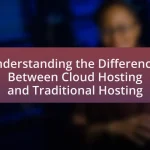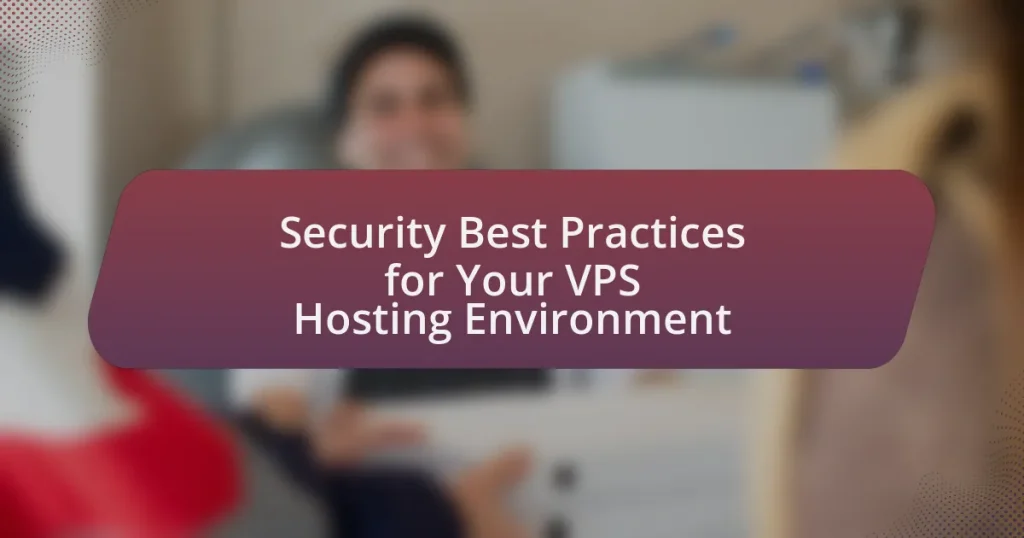The article focuses on security best practices for Virtual Private Server (VPS) hosting environments. It emphasizes the importance of regularly updating software, implementing strong password policies, utilizing firewalls, and enabling SSH key authentication to protect against unauthorized access and data breaches. Key strategies discussed include the use of two-factor authentication, regular backups, and encryption methods to safeguard sensitive information. Additionally, the article outlines monitoring tools and incident response protocols to effectively manage security threats, ensuring a robust security posture for VPS users.
What are the key security best practices for your VPS hosting environment?
The key security best practices for your VPS hosting environment include regularly updating software, implementing strong password policies, using firewalls, and enabling SSH key authentication. Regular software updates are crucial as they patch vulnerabilities; for instance, a study by the Ponemon Institute found that 60% of data breaches are linked to unpatched vulnerabilities. Strong password policies, which include using complex passwords and changing them frequently, help prevent unauthorized access. Firewalls act as a barrier between your VPS and potential threats, while SSH key authentication enhances security by requiring a private key for access, making it significantly harder for attackers to gain entry.
How can you secure your VPS from unauthorized access?
To secure your VPS from unauthorized access, implement strong authentication methods such as SSH key pairs instead of passwords. This approach significantly reduces the risk of brute-force attacks, as SSH keys are more complex and harder to crack than traditional passwords. Additionally, regularly update your software and operating system to patch vulnerabilities, as outdated systems are prime targets for attackers. According to a report by the Ponemon Institute, 60% of data breaches are linked to unpatched vulnerabilities, highlighting the importance of timely updates. Furthermore, configure a firewall to restrict access to only necessary ports and services, which minimizes exposure to potential threats. Using tools like Fail2Ban can also help by blocking IP addresses that show malicious signs, further enhancing your VPS security.
What role do strong passwords play in VPS security?
Strong passwords are critical for VPS security as they significantly reduce the risk of unauthorized access. A strong password typically includes a combination of uppercase and lowercase letters, numbers, and special characters, making it difficult for attackers to guess or crack through brute force methods. According to a study by the National Institute of Standards and Technology (NIST), weak passwords are a leading cause of data breaches, emphasizing the importance of robust password policies in safeguarding virtual private servers. By implementing strong passwords, users can enhance their VPS security and protect sensitive data from potential threats.
How can two-factor authentication enhance VPS security?
Two-factor authentication (2FA) enhances VPS security by adding an additional layer of verification beyond just a password. This means that even if an attacker obtains a user’s password, they would still need a second form of authentication, such as a code sent to a mobile device, to gain access. According to a study by Google, implementing 2FA can block 99.9% of automated attacks, significantly reducing the risk of unauthorized access to VPS environments. By requiring both something the user knows (password) and something the user has (authentication code), 2FA effectively mitigates the risk of credential theft and enhances overall security.
What are the essential software updates for maintaining VPS security?
The essential software updates for maintaining VPS security include operating system updates, application updates, and security patches. Regularly updating the operating system ensures that vulnerabilities are addressed, as outdated systems are prime targets for attacks; for instance, the National Vulnerability Database reported that 60% of breaches exploit known vulnerabilities. Application updates are crucial as they often contain security enhancements and bug fixes that protect against exploits. Additionally, applying security patches promptly is vital, as they are specifically designed to mitigate risks identified in software. Keeping all software up to date significantly reduces the risk of unauthorized access and data breaches.
Why is it important to regularly update your operating system?
Regularly updating your operating system is crucial for maintaining security and performance. Operating system updates often include patches for vulnerabilities that could be exploited by cybercriminals, thereby reducing the risk of security breaches. For instance, according to a report by the Cybersecurity & Infrastructure Security Agency, 85% of successful cyberattacks exploit known vulnerabilities for which patches are available. Additionally, updates can enhance system performance and introduce new features that improve user experience. Therefore, consistent updates are essential for safeguarding your VPS hosting environment against threats and ensuring optimal functionality.
How do application updates contribute to VPS security?
Application updates enhance VPS security by patching vulnerabilities that could be exploited by attackers. Regular updates address known security flaws, thereby reducing the risk of unauthorized access and data breaches. For instance, a study by the Ponemon Institute found that 60% of data breaches are linked to unpatched vulnerabilities. By consistently applying updates, VPS administrators can significantly mitigate these risks and maintain a more secure hosting environment.
What network security measures should be implemented for your VPS?
To enhance network security for your VPS, implement a firewall to control incoming and outgoing traffic based on predetermined security rules. Firewalls act as a barrier between trusted internal networks and untrusted external networks, effectively blocking unauthorized access. Additionally, utilize a Virtual Private Network (VPN) to encrypt data transmitted over the internet, ensuring that sensitive information remains secure from eavesdropping. Regularly update your operating system and software to patch vulnerabilities, as outdated systems are prime targets for cyberattacks. Employ intrusion detection systems (IDS) to monitor network traffic for suspicious activity, allowing for timely responses to potential threats. Finally, enforce strong password policies and consider multi-factor authentication (MFA) to add an extra layer of security against unauthorized access. These measures collectively create a robust security posture for your VPS, significantly reducing the risk of breaches.
How can firewalls protect your VPS environment?
Firewalls protect your VPS environment by monitoring and controlling incoming and outgoing network traffic based on predetermined security rules. They act as a barrier between trusted internal networks and untrusted external networks, effectively blocking unauthorized access and potential threats. For instance, a firewall can prevent malicious traffic from reaching your VPS by filtering out harmful data packets, which reduces the risk of attacks such as Distributed Denial of Service (DDoS) or unauthorized data breaches. According to a report by Cybersecurity Ventures, cybercrime damages are projected to reach $10.5 trillion annually by 2025, highlighting the critical need for robust firewall protection in safeguarding VPS environments.
What is the significance of using a VPN with your VPS?
Using a VPN with your VPS enhances security by encrypting data transmitted between the user and the server, thereby protecting sensitive information from potential interception. This encryption prevents unauthorized access and mitigates risks associated with data breaches, especially when using public networks. According to a study by the Cybersecurity & Infrastructure Security Agency, using a VPN can significantly reduce the likelihood of data exposure during transmission, making it a critical component of a secure VPS hosting environment.
How can you monitor and respond to security threats in your VPS?
To monitor and respond to security threats in your VPS, implement a combination of real-time monitoring tools, regular security audits, and incident response protocols. Utilizing tools like fail2ban, which scans log files for suspicious activity and blocks malicious IP addresses, enhances your ability to detect threats. Additionally, employing intrusion detection systems (IDS) such as Snort can provide alerts on potential breaches. Regularly scheduled security audits help identify vulnerabilities, while having a defined incident response plan ensures swift action against detected threats. According to a 2021 report by Cybersecurity Ventures, organizations that proactively monitor their systems can reduce the impact of security incidents by up to 80%.
What tools are available for monitoring VPS security?
Tools available for monitoring VPS security include intrusion detection systems (IDS) like Snort, log management solutions such as Graylog, and security information and event management (SIEM) tools like Splunk. These tools help detect unauthorized access, analyze logs for suspicious activity, and provide real-time alerts on potential security threats. For instance, Snort can analyze network traffic in real-time to identify malicious activities, while Graylog centralizes log data for easier monitoring and analysis. Splunk aggregates and correlates security data from various sources, enabling comprehensive security oversight.
How do intrusion detection systems work for VPS security?
Intrusion detection systems (IDS) enhance VPS security by monitoring network traffic and system activities for suspicious behavior. These systems analyze data packets and logs in real-time, identifying patterns that may indicate unauthorized access or malicious activity. For instance, an IDS can detect anomalies such as unusual login attempts or unexpected data transfers, triggering alerts for further investigation. According to a report by the Ponemon Institute, organizations that implement IDS experience a 30% reduction in the average time to detect breaches, highlighting their effectiveness in safeguarding VPS environments.
What are the benefits of using log management tools?
Log management tools enhance security by centralizing, analyzing, and storing log data from various sources. These tools enable real-time monitoring, which helps in the early detection of security incidents and anomalies. Additionally, they facilitate compliance with regulations by providing an audit trail of activities, ensuring that organizations can demonstrate adherence to security policies. According to a study by the Ponemon Institute, organizations that utilize log management tools can reduce the time to detect and respond to incidents by up to 50%, significantly improving their overall security posture.
How should you respond to a security breach in your VPS?
Immediately isolate the compromised VPS to prevent further damage. This involves disconnecting it from the network and shutting it down if necessary. Next, assess the extent of the breach by reviewing logs and identifying unauthorized access points. After understanding the breach, change all passwords and access credentials associated with the VPS. Additionally, restore the system from a clean backup if available, and apply security patches to address vulnerabilities. Finally, notify affected parties and consider reporting the incident to relevant authorities, as required by regulations.
What immediate actions should be taken after a breach?
Immediately after a breach, the first action is to contain the breach to prevent further unauthorized access. This involves isolating affected systems, changing passwords, and disabling compromised accounts. Following containment, conduct a thorough assessment to determine the extent of the breach, including identifying the data that was accessed or compromised. Document all findings and actions taken during this process for future reference and compliance purposes. Additionally, notify relevant stakeholders, including affected users and regulatory bodies if necessary, as per legal requirements. These steps are critical in mitigating damage and restoring security in the VPS hosting environment.
How can you prevent future breaches after an incident?
To prevent future breaches after an incident, implement a comprehensive security audit and update your security protocols. Conducting a thorough security audit helps identify vulnerabilities that were exploited during the breach, allowing for targeted remediation. Updating security protocols, such as enhancing firewall rules, implementing multi-factor authentication, and ensuring regular software updates, significantly reduces the risk of future incidents. According to a 2021 report by IBM, organizations that adopt a proactive security posture can reduce the cost of a data breach by an average of $1.2 million.
What are the best practices for data protection in your VPS hosting environment?
The best practices for data protection in a VPS hosting environment include implementing regular backups, using strong passwords, enabling firewalls, and applying software updates. Regular backups ensure that data can be restored in case of loss or corruption, with many VPS providers offering automated backup solutions. Strong passwords and two-factor authentication enhance security by making unauthorized access more difficult. Firewalls act as a barrier against malicious traffic, while keeping software updated protects against vulnerabilities that could be exploited by attackers. According to a 2021 report by Cybersecurity Ventures, 60% of small businesses that experience a cyber attack go out of business within six months, highlighting the importance of these practices in safeguarding data.
How can regular backups enhance data security on your VPS?
Regular backups enhance data security on your VPS by ensuring that data can be restored in the event of loss, corruption, or cyberattacks. When a backup is performed consistently, it creates a reliable point of recovery, minimizing downtime and data loss. For instance, according to a study by the Ponemon Institute, organizations that regularly back up their data can recover from ransomware attacks 50% faster than those that do not. This demonstrates that regular backups not only protect against data loss but also contribute to overall operational resilience.
What backup strategies are most effective for VPS environments?
Effective backup strategies for VPS environments include regular automated backups, offsite storage, and incremental backups. Regular automated backups ensure that data is consistently saved without manual intervention, reducing the risk of data loss. Offsite storage protects against local disasters, as backups stored in different geographical locations remain safe. Incremental backups, which only save changes made since the last backup, optimize storage space and reduce backup time, making the process more efficient. These strategies collectively enhance data security and recovery capabilities in VPS environments.
How often should backups be performed for optimal security?
Backups should be performed at least daily for optimal security. This frequency ensures that the most recent data is preserved, minimizing potential data loss in the event of a system failure or cyber attack. According to a study by the Ponemon Institute, organizations that back up their data daily experience significantly less downtime and data loss compared to those that back up less frequently. Regular daily backups also allow for quicker recovery times, which is crucial for maintaining business continuity.
What encryption methods should be used to protect data on your VPS?
To protect data on your VPS, use AES (Advanced Encryption Standard) for data at rest and TLS (Transport Layer Security) for data in transit. AES is widely recognized for its strong security, being adopted by the U.S. government and recommended by NIST (National Institute of Standards and Technology) for encrypting sensitive data. TLS ensures secure communication over networks, preventing eavesdropping and tampering, and is essential for protecting data transmitted between clients and servers. These methods are proven to provide robust security for data integrity and confidentiality in a VPS environment.
How does data encryption safeguard sensitive information?
Data encryption safeguards sensitive information by converting it into a coded format that is unreadable without a decryption key. This process ensures that even if unauthorized individuals access the data, they cannot interpret it, thereby protecting confidentiality. For instance, the Advanced Encryption Standard (AES) is widely used and recognized for its effectiveness in securing sensitive data, as it employs complex algorithms that make unauthorized access extremely difficult. According to the National Institute of Standards and Technology (NIST), encryption is a critical component of data protection strategies, significantly reducing the risk of data breaches and unauthorized disclosures.
What tools can be used for encrypting data on a VPS?
Tools that can be used for encrypting data on a VPS include OpenSSL, GnuPG, and LUKS. OpenSSL is widely utilized for secure communication and data encryption, providing robust cryptographic functions. GnuPG, or GNU Privacy Guard, offers encryption and signing capabilities for files and emails, ensuring data integrity and confidentiality. LUKS, or Linux Unified Key Setup, is specifically designed for disk encryption, allowing secure storage of data on the VPS. These tools are recognized for their effectiveness in safeguarding sensitive information against unauthorized access.
What practical tips can enhance the security of your VPS hosting environment?
To enhance the security of your VPS hosting environment, implement strong password policies and regularly update software. Strong passwords should include a mix of letters, numbers, and symbols, making them difficult to guess; studies show that 81% of data breaches are due to weak passwords. Regular software updates patch vulnerabilities, reducing the risk of exploitation; for instance, the 2020 Microsoft Exchange Server vulnerabilities highlighted the importance of timely updates, as they were exploited widely before patches were applied. Additionally, using a firewall and configuring it to restrict access to only necessary ports can further protect your VPS.
How can you create a security checklist for your VPS?
To create a security checklist for your VPS, start by identifying key security measures that need to be implemented. These measures include regularly updating the operating system and software, configuring a firewall to restrict unauthorized access, using strong, unique passwords for all accounts, enabling two-factor authentication, and regularly backing up data.
Additionally, you should monitor logs for suspicious activity, disable unused services and ports, and ensure that security patches are applied promptly. According to the National Institute of Standards and Technology (NIST), maintaining a checklist helps in systematically addressing vulnerabilities and enhancing overall security posture.
What common mistakes should be avoided to maintain VPS security?
To maintain VPS security, common mistakes to avoid include neglecting regular software updates, using weak passwords, and failing to implement a firewall. Regular software updates are crucial because they patch vulnerabilities that could be exploited by attackers; for instance, a study by the Ponemon Institute found that 60% of data breaches are linked to unpatched vulnerabilities. Weak passwords can be easily cracked, making it essential to use complex, unique passwords for each account. Additionally, not implementing a firewall exposes the VPS to unauthorized access, as firewalls serve as a barrier against malicious traffic.










